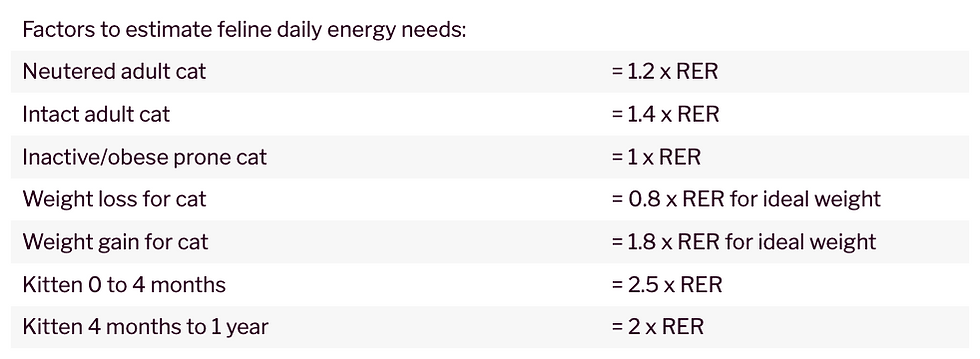
Feeding The Cat
Cats have sensitive guts.
Rescue cats are especially vulnerable due to the stress component of being "in limbo" (ie not in a permanent environment with a stable/consistent routine). Diarrhea and soft stool cases make up the most healthcare cases at TCR. You can do A LOT to help avoid this.
Feeding them a good quality, CONSISTENT diet of predominantly wet food (kibble really packs on those lbs) not only promotes good health for them, it saves TCR money in diarrhea and GI workup at the vet.
What You Should Be Feeding Your Foster Cat.
A fish based diet such as salmon or tuna is great for their gut health as well ask their skin/coat. Good quality foods such as Purina ProPlan, Felidae, Orijen, Wellness, Natural Balance, Merrick or Nature's Variety are preferred.
Avoid a chicken based diet. These are proven to cause gut & skin issues (excessive scratching, licking, fur loss, lesions on the skin).
Avoid feeding novel proteins like duck, venison, lamb, kangaroo, etc. If your foster cat is discovered to have systemic food intolerances/skin allergies, you have introduced these new proteins in their system so the vet prescription diet will not work any more. They could be on medication for life to combat this issue. This reduces their chances of being adopted.
Calculate the calories (based on weight) to feed more wet food than dry food. Wet food promotes hydration and helps to avoid urinary crystals. Speak to your FC about feeding just the right amount. Underfeeding is just as bad as overfeeding. Learn to read the food bags and familiarize yourself with the kilocalories (kcal) or kilojoules (kJ) on the food bag.
NEVER drastically change a cat's diet. Any food changes (which we discourage unless it's to move to a mandatory vet prescription diet) must be transitioned over a course of 7 days. Speak to your FC about how to properly transition a cat's diet.
Junk food like Temptations Treats should be kept to a minimum, and only used as positive reinforcement rewards when a cat is behaving well. NEVER give treats to a cat exhibiting any unwanted behaviour. It just reinforces bad behaviour and reduces the cat's adoptability as well as your frustration as a caregiver.
If a cat is on a strict diet (hypoallergenic, urinary, gastrointestinal, kidney, etc) do not feed anything else. Not even a single treat. It negates the therapeutic effects of the diet and no progress is made in the cat's gut health. This leaves healthcare chasing stool issues for months, and it increases the cat's length of stay in the foster program. If the cat requires a vet prescription diet TCR will provide this food for you.
Quantities to Feed.
Use a cat calorie calculator to calculate resting energy requirements (RER).
The RER fulfills the cat’s basic needs, but does not account for activity level or other factors. To do so, the RER number is multiplied by factors to estimate the cat’s total daily energy needs. Talk to your FC if your cat needs to lose weight. They will calculate the KCAL for you.
Cat food should have the KCAL listed on the tin or bag of food.



Eating Issues.
We recognize that in the early days of adjustment, cats may go on a stress-related hunger strike so Fancy Feast, Friskies, Churu's and other "junk food" may be necessary. The smellier the food the better. Junk food in the early days of adjustment should be temporary.
Cats who do not eat for more than 36 hours are at high risk of fatal fatty liver disease. Obese cats are at risk after 24 hours of not eating. It is more important to get them to eat at this stage, than what they are eating.
If your cat still won't eat after 36 hours notify your foster coordinator, or the cat has other eating issues, read the Common Behavioural Issues section for more information.
Feeding Kittens.
Kittens who have been weaned should only be eating kitten wet & dry food. Your FC can arrange for a supply from a food hub if needed. TCR prefers Royal Canin Kitten, or Royal Canin Mother & Babycat wet & dry food.
Kittens have immature GI systems and are very prone to diarrhea. Kitten food is the best food for them to provide the necessary calories & help with good gut health.
Feed them wet food two or three times a day, and let them eat as much dry food as they like.
See the Kitten Section for more details on how to bottle feed kittens or wean them.
